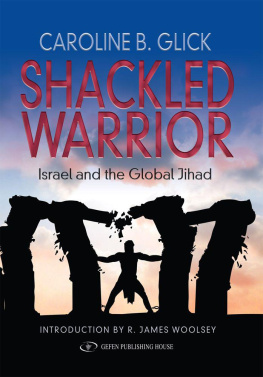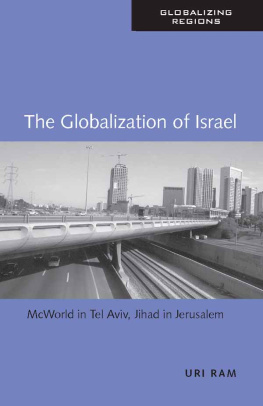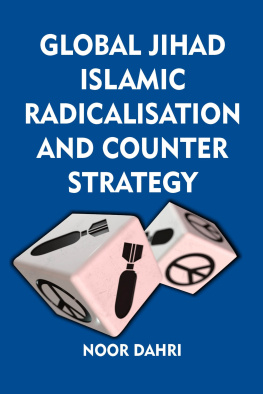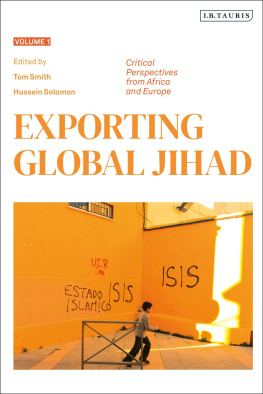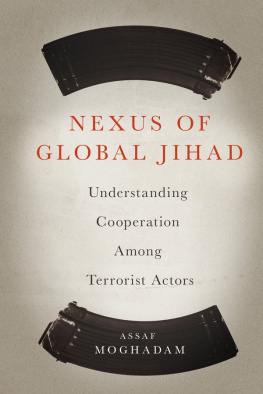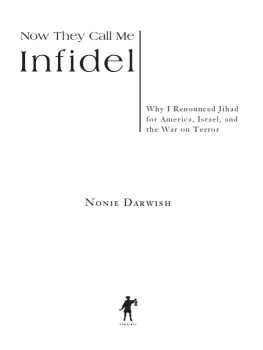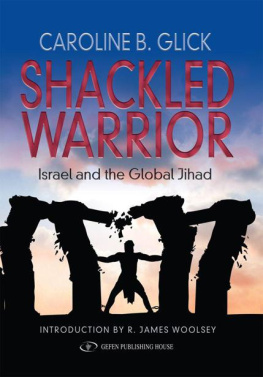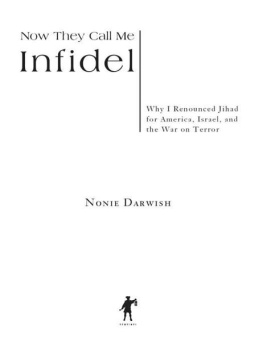Glick - Shackled Warrior: Israel and the Global Jihad
Here you can read online Glick - Shackled Warrior: Israel and the Global Jihad full text of the book (entire story) in english for free. Download pdf and epub, get meaning, cover and reviews about this ebook. year: 2008, publisher: Gefen Publishing House, genre: Religion. Description of the work, (preface) as well as reviews are available. Best literature library LitArk.com created for fans of good reading and offers a wide selection of genres:
Romance novel
Science fiction
Adventure
Detective
Science
History
Home and family
Prose
Art
Politics
Computer
Non-fiction
Religion
Business
Children
Humor
Choose a favorite category and find really read worthwhile books. Enjoy immersion in the world of imagination, feel the emotions of the characters or learn something new for yourself, make an fascinating discovery.
Shackled Warrior: Israel and the Global Jihad: summary, description and annotation
We offer to read an annotation, description, summary or preface (depends on what the author of the book "Shackled Warrior: Israel and the Global Jihad" wrote himself). If you haven't found the necessary information about the book — write in the comments, we will try to find it.
Glick: author's other books
Who wrote Shackled Warrior: Israel and the Global Jihad? Find out the surname, the name of the author of the book and a list of all author's works by series.
Shackled Warrior: Israel and the Global Jihad — read online for free the complete book (whole text) full work
Below is the text of the book, divided by pages. System saving the place of the last page read, allows you to conveniently read the book "Shackled Warrior: Israel and the Global Jihad" online for free, without having to search again every time where you left off. Put a bookmark, and you can go to the page where you finished reading at any time.
Font size:
Interval:
Bookmark:

WARRIOR


David Bar-Illan (19302003), was a renowned concert pianist, the editor of the Jerusalem Post, Prime Minister Binyamin Netanyahus Director of Communications, and a warrior for human freedom and the rights of the Jewish people through and through. He was also my mentor and my friend. Without his encouragement and faith in me, I would have never been able to write. This book is dedicated to his memory.
Foreword
When I was growing up in Oklahoma in the 1950s, the highest praise you could get from my parents and grandparents all from the small towns and ranches of Oklahoma and West Texas was to be told youd showed gumption. My dictionarys definition of gumption is initiative, aggressiveness, resourcefulness; courage, spunk, guts.
But even those synonyms dont quite do justice to gumption. It was the characteristic that made it possible for my parents Great Generation to surmount the Depression and win WWII . It is, essentially, the best one can do in dealing with anything tough in life.
As I later learned, it is something like the US Navys Bravo Zulu (meaning Well Done, in naval signaling). Just as there is no Very Well Done, in the US Navy there is at least in Oklahoma-speak no extraordinary gumption. Just gumption.
Its not easy to describe what Caroline Glick does neither journalist, nor reporter nor woman of letters really fits her, and this collection is more than just a remarkable set of well-written and vivid columns and reports. I think of Caroline Glick not just as someone who chronicles the politics, morals, tactics, and implications of the leading issues of our time but more importantly as our chief gumption-keeper.
If you are put off by straight-from-the shoulder prose or have a soft spot in your heart for political correctness, you may want to find something else to read. But if your taste runs to appreciating skillful and direct confrontation of cant, duplicity, appeasement, and wishful thinking along the lines of the writings in the 1930s of George Orwell and Winston Churchill, but on todays manifestations of the issues those men confronted so brilliantly then youve got the right book in hand.
Some of the things youll find in this collection:
- A superb essay on the parallels and differences between Woodrow Wilson and George W. Bush;
- A fresh and subtle assessment of the politics of Holocaust denial;
- A forthright interview with Jonathan Pollard and an insightful assessment of the implications of his case I fell in love with two women Israel and the US . It doesnt work in private life, and it doesnt work in politics.
- An assessment of the reasons behind academic cowardice, as manifested in such places as Cambridge Universitys Clare College;
- An analysis of enemy propaganda creeping into the broadcasts of US -government-funded Al-Hurra (more extreme [on some issues] than Al-Jazeera);
- A careful analysis of demographics in the Near East that contradicts the conventional wisdom;
- A discussion of the battle over language in public discourse and its importance (i.e., what does it mean when terrorists are called militants?);
- Bravery and straight talk by Pope Benedict XVI and Ayaan Hirsi Ali;
- An American officer reading to his men from the Book of Joel on the eve of the invasion of Iraq: The Lord thunders at the head of His army;
- A good definition of peace: When an Israeli woman reporter can feel as safe in a 5-star Kuwaiti hotel as with the US Army [in combat].
Glick concludes this remarkable collection with a call for Jews and indeed for all of us who live in a civilization guided by the concepts of liberty and the rule of law that Judaism has given the world to emulate Pope Benedict in his willingness to judge.
She does. So should we.
By R. James Woolsey,
Former Director of Central Intelligence
Nine days after the September 11, 2001, attacks on the United States, President George W. Bush stood before a joint session of Congress and announced, Our war on terror begins with al-Qaeda, but it does not end there. It will not end until every terrorist group of global reach has been found, stopped and defeated.
At the time, with so many momentous events seemingly happening at once, the full strategic significance of that comment went largely unnoted. The president of the United States had just declared war. It was clear that the US would soon respond in a massive way to the attacks on its soil.
But for many in Israel, the meaning of that statement was as immediately clear as it was harsh. A year before, the Palestinians had begun their terror war against Israel. By limiting the definition of the enemies of the free world to terrorist groups with global reach, President Bush was explicitly removing Palestinian terrorists from the enemy camp. Correspondingly, Israel was not included in the camp of allies.
Many commentators have rightly criticized the Bush administrations decision to name the war the War on Terror. After all, terror is not an enemy. It is a tool of war. To limit the aims of the war to the eradication of the suicide bomber or the roadside bomb means that the actual enemy which wields these weapons in order to advance its nefarious aims is never addressed.
While it is rarely acknowledged by Western leaders, the identity of the enemy is not hidden from view. The forces of jihad whether comprised of state actors or non-state actors are the enemy in this war. Consequently, anything that advances jihads aim of Islamic domination is antithetical to the interests of the free world. Anything that harms that cause advances the interests of human liberty and freedom. Given that terror is but a tool of war for the jihadists, countering terrorism, while necessary, is not sufficient to win the war.
By declaring that the war is against terror organizations of global reach the US hurt the cause of freedom twice. First, it denied itself the ability to acknowledge and understand the enemy that uses terror against it. Second, by limiting the scope of the fight to global terror groups, it divested itself of the ability to see and understand the relationships between local jihadist groups and the larger global arena. When jihadists in Pakistan or Gaza or the Philippines or Nigeria call for the establishment of a caliphate in their neighborhood, is it reasonable to dismiss them as mere local political forces in the event that a direct link cannot be made between them and Osama bin Laden?
The US has not been alone in failing to accept the significance of jihad and Israels unique importance to the forces of jihad worldwide. Israel too has ignored these basic realities. Israeli leaders from Shimon Peres to Ehud Olmert have argued that if the Palestinian war against Israel is a jihad a religious war then that means that there is no way to peacefully resolve the Palestinian conflict with Israel. Since they wish to peacefully resolve the Palestinian conflict with Israel, as far as they are concerned, the Palestinian war against Israel cannot be a jihad.
Sadly, despite the best efforts of both the Bush administration and successive Israeli governments to dictate for their enemies who they can and cannot be and what they can and cannot stand for, American and Israeli arguments have failed to convince the jihadists. For them, the Palestinian jihad against Israel, the only non-Islamic enclave from the Mediterranean Sea to India, is a central front in the global jihad.
Next pageFont size:
Interval:
Bookmark:
Similar books «Shackled Warrior: Israel and the Global Jihad»
Look at similar books to Shackled Warrior: Israel and the Global Jihad. We have selected literature similar in name and meaning in the hope of providing readers with more options to find new, interesting, not yet read works.
Discussion, reviews of the book Shackled Warrior: Israel and the Global Jihad and just readers' own opinions. Leave your comments, write what you think about the work, its meaning or the main characters. Specify what exactly you liked and what you didn't like, and why you think so.

